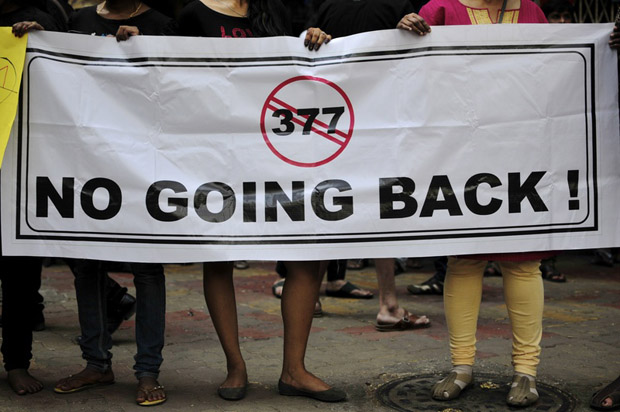
From a protest in Mumbai against Section 377 of the Indian Penal Code which, among other things, bans gay sex (Image: Abhishek Chinnappa/Demotix)
I woke up on 11 December to a phone call from my friend. She was in tears: “My parents would rather have me married than arrested. They are constantly saying that even the Supreme Court thinks my ‘lifestyle’ is illegal.” I wasn’t sure whether she was pulling a prank on me. It turns out she wasn’t. The date 11.12.13 had tossed at us a judgment that sent shockwaves through India’s LGBTQ population. The July 2009 ruling from the Dehli High Court, decriminalising sex between two consenting adult, including “gay sex”, had been overruled by the Supreme Court.
The Delhi High Court had ruled that Section 377 of the Penal Code was in violation of the Constitution — specifically Article 14 which guarantees “equality before law”, Article 15 which prohibits discrimination on the basis of “religion, race, caste, sex or place of birth” and Article 21 which protecting “life and personal liberty.” The Supreme Court, however, stated that the section can be repealed or amended only by the Indian Parliament.
“While reading down Section 377 IPC, the Division Bench of the High Court overlooked that a minuscule fraction of the country’s population constitute lesbians, gays, bisexuals or transgender people and in last more than 150 years less than 200 persons have been prosecuted (as per the reported orders) for committing offence under Section 377 IPC and this cannot be made sound basis for declaring that section ultra vires the provisions of Articles 14, 15 and 21 of the Constitution,” the Supreme Court stated. Is the implication that just because the LGBTQ community is a minority, it can do without basic human rights? If quantity is the yardstick, then surely we need not fight discrimination against the disabled, religious minorities or the tribals anymore?
After the Delhi High Court ruling, there was a general climate of optimism regarding the rights of sexual minorities. This is not to say that police harassment stopped or lesbians stopped committing suicide. Unlike in the past, this year’s the Chennai Pride march was not given permission to go along the beach, and had to change its route at the last minute. Parts of the route for the Hyderabad Pride parade was in areas with little traffic and hence had little visibility. Despite the official estimates, human rights groups like the People’s Union of Civil Liberties, Karnataka have extensively researched and published reports on how Section 377 has been widely used by the police and society at large to harass homosexuals, male sex workers and transgender people. Extortion, blackmail, rape, physical assaults have gone unreported in a climate of fear.
What if my family/neighbourhood/office comes to know of my orientation? Will I lose my job? Will my family disown me? Do I have affordable legal support at hand? These are some very basic questions that have played on the minds of hundreds of thousands within the LGBTQ community. Section 377 does not imply that one can simply be arrested for one’s sexual orientation; strict material evidence of specific sexual acts is necessary for arrest. But fear creates a vicious cycle of ignorance and more fear. Facts get subsumed and a threat becomes enough to buckle under. Combined with the country’s reactionary obscenity laws, this becomes a potent cocktail for further harassment.
Yet, organisations like Sappho for Equality have conducted regular workshops with the police and the medical establishment, and have found a largely receptive audience. Nine transgender people across the country came together to produce an album and television soaps featured queer tracks. Two of the four short films in “Bombay Talkies” — a compilation celebrating 100 years of Indian cinema, released earlier this year — dealt with the topics homosexuality and transgenderism. Commercials have targeted the modern, urban Indian LGBTQ population. So much so, that many researchers (including myself) started writing about elitism in the Queer movement. This is the backdrop against which the Supreme Court made its ruling! Where does this take us back to? Sappho’s members wonder whether they will be allowed space in governmental agencies anymore. Ranjita Sinha of ATHB (Association of Transgender/Hijra in Bengal) already reports how complaints of harassment are pouring in, citing the examples of Bijoy Maity, who was physically assaulted on the evening of the judgment by locals who did not want an “effeminate” neighbour.
The media has been largely supportive but this support has a flip side too. Each time they flash the ticker, “Homosexuality criminalised”, they end up perpetuating a climate of fear. Yet, Section 377 is not only about the rights of sexual minorities to be themselves and to choose how and whom they love. It also criminalises sex “against the order of nature” and hence even heterosexuals practising oral and anal sex — in other words non procreative sex — can fall within its ambit. The State is entering your bedroom and infringing your integrity and your bodily autonomy — it is dictating your sex life. Anybody, irrespective of sexual orientation, should be concerned by this judgment, a fact yet to be highlighted by the media. The largest democracy of the world is faced with a very basic question. Is it even a democracy if it cannot uphold the fundamental rights of its citizens? As we ponder this question, come on the streets and scream for our rights, my friend and many like her are faced with the uphill task of claiming and reclaiming their right to be themselves.




